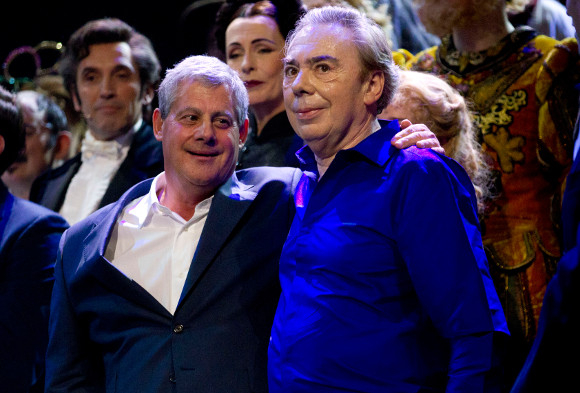Michael Coveney: Cameron speaks out on saving theatres, Sherlock implodes
Cameron Mackintosh gives a strongly-worded interview on the subject of theatre upkeep, while the latest series of the BBC’s ”Sherlock” reaches an acclaimed climax and the Golden Globes take place in LA

Cameron Mackintosh was not pulling rank, exactly, but certainly laying down a few laws in an interview with the Evening Standard on Friday, when he reminded Nick Curtis that he maintained his West End theatres in tip top condition because he could afford to. He also said that there had been too much "ill-informed scare-mongering" in the wake of the Apollo ceiling collapse.
He claimed that he had spent about £50m on his theatres, about a quarter of which amount came from the £1 restoration levy that he and the rest of them have put on the ticket prices. He first instituted that levy – initially at 75p per ticket sold – at the Prince of Wales and the Prince Edward ten years ago. The Ambassador Theatre Group and then the others followed suit.
Sir Cameron knocked firmly on the head the idea that government grants and private enterprise should come to the aid of maintaining theatres, pointing out that all the theatres were built for private entrepreneurs, and that is where they belong – "rather than with hedge funds" he added, taking a swipe at ATG's recent buy-out by Providence Equity, reportedly for £350m.
In other words, he plans to look after his theatres with the money he has made from them. No doubt Andrew Lloyd Webber can do the same, and Mackintosh seemed to imply, too, that ALW's argument that some theatres, including the Apollo, are not fit for purpose and should be replaced by modern buildings, is specious.
Two of Mackintosh's seven theatres date from the 1930s, the others are Edwardian; "They've needed a lot of work doing to them," he says, "but they were built very well… It isn't true to say that these theatres are 100 years old and have [therefore] lost their sense of purpose. With thought and with a decent – not astronomical – amount of money you can reinvent these buildings and make them belong to the 21st century."
And he cites the £45m restoration of the Royal Court and the brilliant re-imagining of Sadler's Wells (though, personally, I miss the moth-eaten red plush atmosphere of the old Wells, not to mention the proper cheese and beetroot sandwiches in the bar).
But what happens if Cameron's empire collapses or, as is more likely, the profits disappear or drain away in 50 years' time after we've all gone to the Green Room in the sky? The Theatres Trust said that bringing the 40 West End theatres up to date in 2003 – and it was deemed urgent business way back then – would cost £250m. That cost is probably doubled now. And any work on them, like any work on a Victorian house, is necessarily short term-fixing. Well, perhaps fixing for another hundred years at most.
I suppose the answer to that is: we can only deal with the situation as best we can while we're here and hope that another Cameron Mackintosh comes along in 20 years' time to take up the challenge. A period of adjustment is a permanent condition of all theatrical activity.
Talking of which, have you been watching Sherlock on the television? It's completely bonkers and brilliantly acted. The last of the three episodes in the latest series starring scary Benedict Cumberbatch and wacky troglodyte Martin Freeman as Holmes and Watson went out on BBC1 last night: it was mesmerising and baffling in equal measure, and I've only read five-star reviews.
Everything was going along just fine – Holmes had a new girlfriend, a newspaper mogul was taking over the world, Watson's new wife was not as straightforward as she seemed, Mark Gatiss as Mycroft was as magnificently supercilious as ever, the cinematography was great – and then Holmes got shot.
The story went into flashback and futuristic free-fall, totally out of control, with Andrew Scott as Moriarty frothing at the mouth in a padded cell (was that the afterlife or is he not dead, either?) and hobbled along to a badly organised and lazily ambiguous final reel of sentimental flights, resolutions and farewells.
In a cosy family Christmas interlude, Holmes' parents turned out to be Bendy's parents, too: Timothy Carlton and Wanda Ventham, and how very jolly it was to see them, along with a rather under-used Lindsay Duncan and the ever delightful Una Stubbs as the housekeeper in Baker Street; turns out that she also has a bit of a shady past. But I doubt if we'll see or learn any more of it. If ever a great television series suffered a self-inflicted nervous breakdown, this seemed to be it.
Only moderately good news for the Brits from the Golden Globes, as the awards season – climaxing, of course, in the WhatsOnStage winners' concert at the Prince of Wales on Sunday 23 February; vote now, then buy your ticket! – rumbled into gear in Los Angeles last night: 12 Years a Slave unsurprisingly won the best dramatic film award (so Chiwetel Ejiofor at least made it onto the podium with the producers) and Sally Hawkins looked great in vintage Dior on the red carpet.
Otherwise, Cate Blanchett quite rightly won best actress for Blue Jasmine and Amy Adams and Jennifer Lawrence best comedy actress and supporting actress in American Hustle, both brilliant. Golden (globe) ages, I always say, belong to the past, but a golden age of stage and screen acting seems always to be with us, from Sherlock on the BBC to American Hustle in Hollywood.












